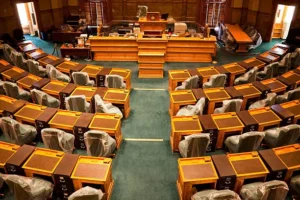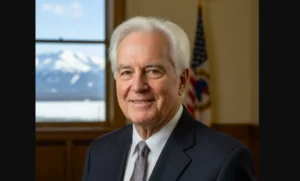Alaska’s new election system, including open primaries and ranked-choice voting, has become a model for states addressing political polarization and voter choice concerns. Introduced in 2022, these changes contributed to the historic election of Alaska’s first Native American to Congress. Yet, their longevity remains uncertain.
Opponents of ranked voting strive to repeal it and are embroiled in a legal battle over whether their initiative will remain on Alaska’s November ballot.
This is just one instance this year of an escalating conflict over a broader method for voters to select candidates, fueled in part by profound dissatisfaction with the current state of affairs and resistance from political parties and partisan organizations wary of losing influence.
In at least two states – Democratic-leaning Oregon and Nevada – voters will decide whether to adopt new election procedures incorporating ranked voting this autumn. In staunchly conservative Idaho, groups are advocating for a November ballot initiative to reverse a ban on ranked voting imposed last year by the Republican-controlled legislature. Measures proposing ranked voting, also known as ranked-choice voting, are also under consideration in Colorado and the District of Columbia.
In Missouri, a proposal pushed forward by the GOP-controlled legislature will appear on the November ballot, seeking voter approval to prohibit ranked voting. This action comes after a failed citizen-led effort in 2022 to introduce an Alaska-style system for voters to consider. Ranked voting has been banned in at least nine states, with the Louisiana legislature also recently passing a ban this month.
AJ Simmons, research director at the Center for State Policy and Leadership at the University of Illinois Springfield, who has extensively studied the subject, says efforts to introduce alternative methods of electing leaders, coupled with resistance from entrenched power structures, reflect widespread dissatisfaction with the state of national politics and apprehension about the future of democracy.
“We’re seeing a group of frustrated and concerned individuals searching for solutions to the problems they perceive,” he remarked. “For some, the question arises: could our method of choosing leaders be part of the problem?”
Only two states, Maine and Alaska, utilize ranked voting for their respective state primaries and federal elections. Numerous U.S. cities, such as New York, San Francisco, and Minneapolis, have adopted ranked voting, with Portland, Oregon, slated to implement it this autumn. Additionally, a longstanding pilot program in Utah permits cities to conduct local elections using ranked voting.
Proponents view ranked voting as a more inclusive method, offering voters increased options while mitigating negative campaigning. Candidates require a broad coalition of support to prevail.
In Alaska, the ranked-choice voting process involves counting ballots in rounds: A candidate can win outright if they garner over 50% of the vote in the initial round. Should no candidate reach this threshold, the candidate with the lowest number of votes is eliminated. Votes cast for the eliminated candidate are then reallocated to the voters’ next preferred choice. This process continues until only two candidates remain, with the candidate amassing the most votes and ultimately declaring the winner.
According to Simmons, assessing the impact of ranked voting on elections is challenging due to variations in systems across different locations, making comparisons problematic.
In Alaska, the primary system advances the top four vote-getters in a race, regardless of party, to the general election, where ranked voting is employed. Proposals in Nevada and Idaho mirror this approach, while Oregon intends to maintain closed primaries and restrict ranked voting to federal and top statewide races, including the gubernatorial contest.
The efficacy of ranked voting as a remedy for voter disengagement and frustration remains to be determined, but many are receptive to exploring the concept.
“I believe in the marketplace of ideas, and if there isn’t genuine competition, the ability for people to engage in meaningful debate, to seek comprehensive answers, is compromised because one side may not feel compelled to participate fully. This ultimately undermines our democratic process. So, if ranked voting contributes to fostering such competition, that’s excellent,” remarked Brett DeLange, a retired deputy attorney general from Idaho.
While Oregon’s proposal originated from the Democratic-led legislature, in many cases, the ruling party opposes ranked voting due to the uncertainty it introduces to election outcomes.
Republicans in Idaho currently control the legislature and occupy every statewide office. They have launched attacks against the proposed ranked voting citizen initiative. State Republican Party Chairwoman Dorothy Moon described it as “a harmful scheme aimed at stripping away your ability to vote for conservative lawmakers.”
Efforts to hinder the initiative were made by a state lawmaker proposing an amendment to the Idaho Constitution to restrict all elections to a single round of voting. State Attorney General Raul Labrador faced legal action from initiative supporters, who accused him of issuing a biased title for the initiative, resulting in an unsuccessful lawsuit.
Similarly, in the District of Columbia, the Democratic Party attempted to block the ranked voting initiative through legal action, arguing that it violates the city’s charter mandating partisan elections for top officials.
Sondra Cosgrove, a history professor at the College of Southern Nevada and supporter of the ranked voting initiative in her state, has closely observed Alaska’s system. She notes that many voters perceive political parties as wielding excessive influence and feel disillusioned by the lack of genuine choice.
“We have some races where there’s only one candidate, and then there are other races with around 15 candidates, all making extreme statements,” said Cosgrove, who serves as the executive director of the civic engagement nonprofit Vote Nevada. “My students often wonder, ‘Why can’t we have something in between?'”
In Alaska, advocates and opponents of ranked voting alike point to the success of Democrat Mary Peltola two years ago. She won in special and regular elections for the state’s sole U.S. House district, defeating both Republicans, former Gov. Sarah Palin and Nick Begich, following the passing of Republican Don Young, who had held the seat for 49 years.
Initially skeptical about ranked voting, Democrat Kay Brown believes it should be implemented for several more election cycles to allow voters to evaluate its effectiveness fairly. Brown emphasized the significance of Peltola’s victory, stating, “I can’t deny the results we’ve witnessed.”
On the other hand, Phil Izon, a key figure in the movement to repeal ranked voting, was inspired to initiate the repeal effort after his grandfather expressed confusion about the system’s mechanics. Izon’s initiative to repeal ranked voting has faced controversy and legal challenges, with arguments scheduled for Tuesday regarding its inclusion on the November ballot.
Izon, who identifies as politically independent, pointed out that some individuals tend to vote for only one candidate, potentially leading to premature exhaustion of ballots and producing unpredictable outcomes like Peltola’s victory in the House race.
Amber Lee, an independent and one of the plaintiffs in the lawsuit opposing the repeal initiative’s inclusion on the ballot, believes that the ranked voting system expands voter choice. “I believe we should continue to explore this,” she stated. “We’re not seeing progress in Alaska with our current methods.”











